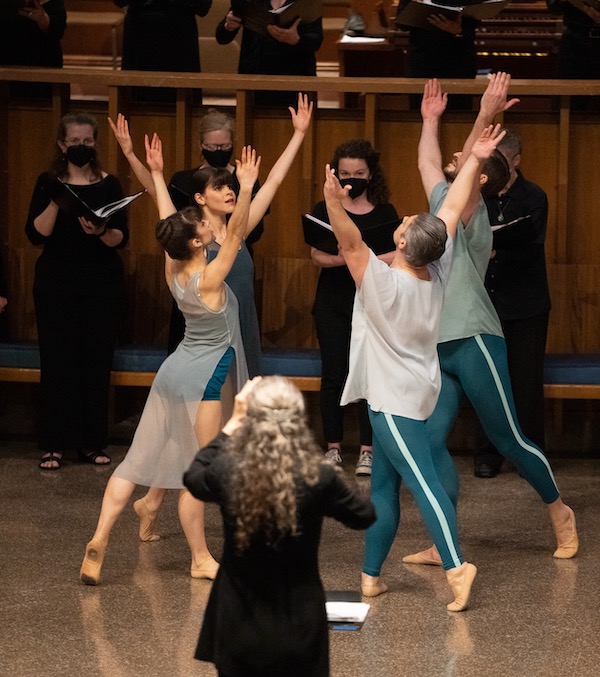Arresting Simpson premiere highlights return of Cantate Chamber Singers

Victoria Gau conducted Cantate Chamber Singers (with dancers) in the group’s first concert in two years Sunday at Bradley Hills Presbyterian Church. Photo: Jeff Malet
The Cantate Chamber Singers performed for the first time in two years Sunday afternoon at the Bradley Hills Presbyterian Church. Much has happened in the intervening period, and as music director Victoria Gau noted on Sunday, “we were unable to process it in real time with you, as we like to do with our music.”
To catch up, the ensemble premiered two works, one addressing the pandemic and one addressing the murder of George Floyd and the ensuing public reaction.
Cantate’s effort to engage with current events is admirable, but both billed works proved uneven.
Charlie Barnett’s I Hold Your Name was inspired by the disruptions of the pandemic. The composer sets a poem written by Adrianna Smith, which Lucy Brown McCauley then choreographed the music, with dancers Alison Bartels, Elena Olshin, Patrick Green, and Dustin Kimball deftly executing Brown McCauley’s moves on Sunday.
Smith’s poem begins with an arresting image: “We watched spring bloom [from] behind our windows/with mouths covered and agape.” But after that her text proffered mostly mundane generalities like “Waiting, waiting. So much has changed.”
Her setting also is repetitive as when women sang a phrase first, then men, in a too-obvious show of pandemic separation. The music likewise overuses devices with a rumbling motif separating sections, which stopped feeling menacing by the end. Rhythms and harmonies felt tame and lacking in crucial contrast. Ultimately, Brown McCauley’s choreography evoked images of collaboration and separation more effectively than either the music or the text.
Just One was composed by Cantate keyboardist Andrew Earle Simpson shortly after George Floyd’s murder. The text was supplied by another Cantate member, longtime bass Roberto N. Ifill.
Simpson’s music establishes a march tempo at the beginning, and drummer Chris DeChiara drives the music. The combination crackled with intensity, although on Sunday the drums sometimes drowned out the chorus.
Simpson’s declamatory style of text-setting suited Ifill’s tricky-to-sing words like “implicated” and “reflexive.” Sometimes the forward momentum meant the music glided past the words, but Simpson did stop to create dramatic musical effects in some couplets like “We talk in awkward circles/We fall back in silence.”
Just One ends with its most arresting moment—the chorus singing the words “I am just that one,” meaning the person who can make a difference, and sustaining the word “one” while Simpson and DeChiara tattooed wild dissonances and martial drumrolls, showing that making a difference would still be a struggle. Those measures showed the potential of Just One, and perhaps some judicious revision could make the work even stronger.
There were some screechy top notes from sopranos at high volume, yet the Cantate singers’ skills showed more in the shorter pieces that made up the balance of the program.
Particularly noteworthy were Karen P. Thomas’ subtle, luminous setting of a Hildegard von Bingen text, Caritas Abundat, and the detailed craftsmanship and complex harmonies of James Lee III’s setting of text from Psalm 51, A Clean Heart.
The concert began with an unbilled opener, the Ukrainian national anthem, followed by a poignant moment of silence—another example of the Cantate Chamber Singers’ laudable efforts to reflect the world around them.

